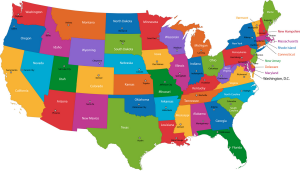The mainstream population always seems to view Florida as the best retirement destination. In many respects, most of the population is correct in that it is one of the most desirable places to live during your retirement. However, it’s not the most tax-friendly state when you review all of the other states.
 Our approach
Our approach
While the IRS generally taxes retirement income unless it’s held in a Roth IRA, many states do not. As such, we reviewed all of the states that do not impose a state tax on retirement income. In addition, we identified states with no income, estate or inheritance tax. Lastly, we found several states will low property and sales tax rates.
1 – Wyoming is the most tax-friendly state for retirees
You may be surprised to learn that Wyoming is the most tax-friendly state for retirees. They have no state income tax and this includes retirement income and social security benefits. What’s more, the state sales tax is one of the lowest in the country at 4% with exemptions in entirety for prescriptions and food consumed at home. We would just note that some counties will impose an additional 3% tax. Lastly and this is a great property tax perk, for most property, only 9.5% of the market value is subject to tax. For instance, if a home is valued at $500,000, $4,250 is the assessed tax base. If you’re wondering why taxes are so low in Wyoming, it’s because of the states revenues generated from oil and mineral rights.
2 – Nevada is the second most tax-friendly state for retirees
Similar to Wyoming, there is no state income or estate/inheritance tax. In addition, retirement income and social security benefits aren’t taxed. The sales tax is fairly low at 6.5% and counties may only tax an additional 1.25%. Property tax rates are attractively low with assessed values at 35% of the fair market value, but not as low as Wyoming. There’s also not property tax breaks for seniors as is the case in Wyoming.
3 – Florida is the third most tax-friendly state for retirees
States that don’t have an income tax or a reliable revenue source like in Wyoming, need to make up for the lost revenue elsewhere. This is exactly the case in Florida. While there aren’t many other taxes, sales tax rates can be as high as 7.5%. What’s more, property tax rates are assessed at 100% of the market value. There is a homestead exemption to lessen the property tax burden of up to $50,000 and additional $50,000 for seniors over 65 with low-income, but it can still be high. This is especially the case for retirees with homes valued more than $250,000.
Which states have no income tax?
The seven states that have completely no income tax are: Florida, Alaska, South Dakota, Nevada, Texas, Washington and Wyoming. Two other states that also have favorable tax laws are Tennessee and New Hampshire which only tax dividends and interest.
Taxes are only one factor
Retirees should also consider states with a low cost of living as well as the location of family members. As seniors get older, they will need to rely more and more on their children to take care of them.
More Questions? Browse Answers or ask your tax planning questions online.
Related Articles
->Should I Still Contribute To My 401K When I’m In My 60s?
->Is There A Way To Avoid IRA Required Minimum Distributions?
->Which States Offer Retirees The Greatest Tax Benefits?
->When Should I Start Taking Social Security Benefits?
->How Can I Determine When I Can Afford To Retire?


